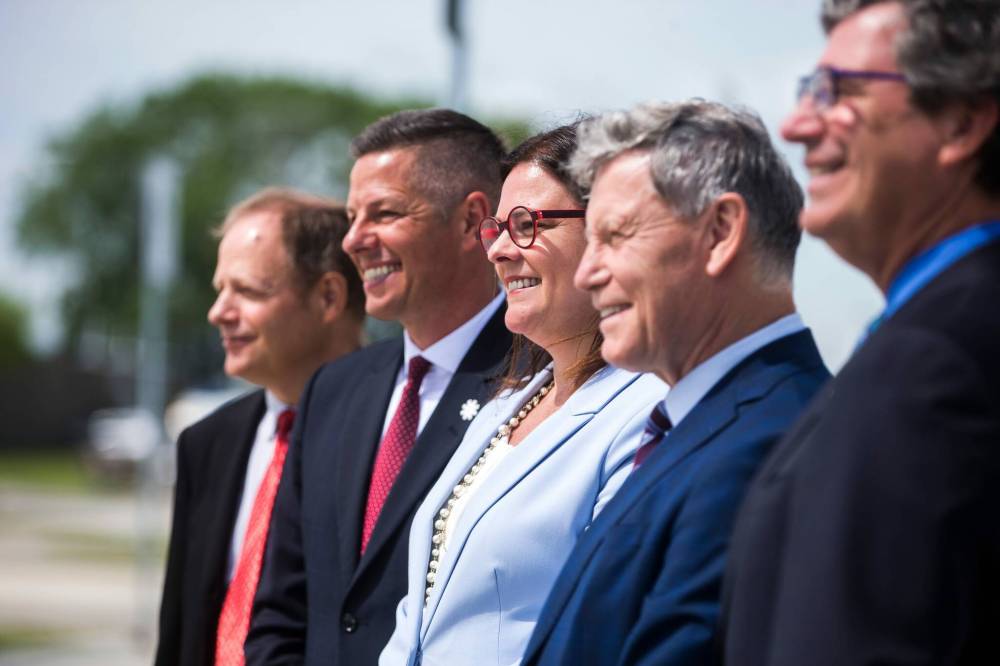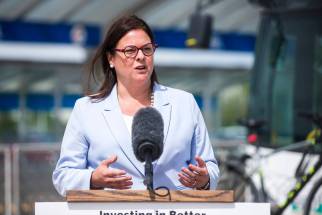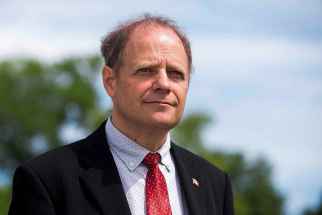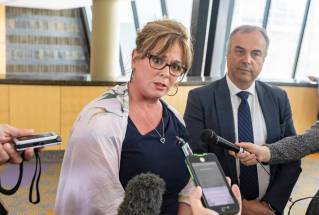Health-care transfers at heart of premiers meeting: Stefanson
Read this article for free:
or
Already have an account? Log in here »
To continue reading, please subscribe:
Monthly Digital Subscription
$0 for the first 4 weeks*
- Enjoy unlimited reading on winnipegfreepress.com
- Read the E-Edition, our digital replica newspaper
- Access News Break, our award-winning app
- Play interactive puzzles
*No charge for 4 weeks then price increases to the regular rate of $19.00 plus GST every four weeks. Offer available to new and qualified returning subscribers only. Cancel any time.
Monthly Digital Subscription
$4.75/week*
- Enjoy unlimited reading on winnipegfreepress.com
- Read the E-Edition, our digital replica newspaper
- Access News Break, our award-winning app
- Play interactive puzzles
*Billed as $19 plus GST every four weeks. Cancel any time.
To continue reading, please subscribe:
Add Free Press access to your Brandon Sun subscription for only an additional
$1 for the first 4 weeks*
*Your next subscription payment will increase by $1.00 and you will be charged $16.99 plus GST for four weeks. After four weeks, your payment will increase to $23.99 plus GST every four weeks.
Read unlimited articles for free today:
or
Already have an account? Log in here »
Hey there, time traveller!
This article was published 07/07/2022 (1251 days ago), so information in it may no longer be current.
OTTAWA — Manitoba Premier Heather Stefanson says she’s getting impatient at the federal government constantly kicking down the road a discussion on health-care transfers — and it’s making it hard to keep a diplomatic tone.
“I would prefer to work in a collaborative way, and I think it’s important that we try to take that approach,” Stefanson told the Free Press.
“But the challenge here is that we’re not even able to get a table to start these discussions, so that really concerns me.”
The premier was speaking Thursday ahead of the first in-person meeting her peers will undertake since the COVID-19 pandemic started, in Victoria (July 11-12).

While they plan to discuss inflation, affordability and labour gaps, the premiers are keeping their years-long focus on urging Ottawa to increase its share of health-care spending.
Even before the COVID-19 pandemic, the provinces argued hallway medicine was the end result of a funding formula that hasn’t kept up with an aging population and advances in medical technology.
The Liberals have largely avoided discussing the health-care transfer, constantly pointing to federal spending on COVID-19 costs, including top-ups aimed at clearing surgical and diagnostic backlogs.
“I would prefer to work in a collaborative way, and I think it’s important that we try to take that approach. But the challenge here is that we’re not even able to get a table to start these discussions, so that really concerns me.”
– Premier Heather Stefanson
“We have committed that we will increase transfers to the provinces,” Prime Minister Justin Trudeau said in April 2021, but the details as to how much “needed to wait until we’re through the worst of this crisis.”
Stefanson and her peers argue that means now.
“We really need this federal government to be there at the table with these challenges that we’re facing, because it’s not unique to Manitoba; it’s across the country.”
The premiers have urged Ottawa to go from paying 22 per cent to 35 per cent of their health-care costs, which would cost about $28 billion this year.

In April, the federal budget made no change to the existing health-care transfer. It also had no timeline for hiring doctors and nurses, and delayed a promised mental health top-up.
A month prior, federal Health Minister Jean-Yves Duclos said his government wanted to avoid a “sterile fiscal debate,” and instead outlined five priorities for the health-care transfer, such as having enough family doctors, digital health records and mental health.
Duclos said the Liberals respect provincial autonomy, but also want to see specific outcomes from any increased funding.
Stefanson argued provinces can show results in how they spend the money Ottawa provides, but said the Liberals shouldn’t keep tying more health-care money to specific uses.
“I have no problem being accountable for this, but the challenge is that every province is unique in terms of where we need to expend those resources.”
– Premier Heather Stefanson
“I have no problem being accountable for this, but the challenge is that every province is unique in terms of where we need to expend those resources,” she said. “That’s really why we need this to go into the baseline funding.”
However, Stefanson said she shares many of the goals Ottawa has outlined, including more cash for mental health and addictions.
She also said Ottawa could play a role beyond just transferring money, such as in boosting the number of health-care workers. The PC government has promised programs to ease how nurses educated abroad can get local credentials, for example.
“We’re doing what we can here in Manitoba, but that’s exactly why we need to take a national, collaborative approach to this very significant issue, which is a labour shortage in these areas,” the Tory premier said.
“That’s another reason why we just need to get to the table, and have a discussion.”
dylan.robertson@freepress.mb.ca
No immigration boost yet: premier
OTTAWA — Manitoba Premier Heather Stefanson says she’s still waiting to see whether the federal Liberals will boost the number of skilled immigrants the province can welcome to fill labour gaps.
“I have not heard any update yet, but it is something that we will be bringing to B.C.,” Stefanson said, ahead of a meeting next week with her fellow premiers in Victoria.
Days after taking office in November, Stefanson spoke with Prime Minister Justin Trudeau, and reiterated Manitoba’s request for a higher quota under the provincial nominee program, which lets companies sponsors skilled workers abroad.
“He was very open to working together on that,” she said. “Obviously, I want to find that collaborative approach.”
Yet, there has been no indication Manitoba will be getting a higher share of the federal quota, Stefanson said Thursday. In May, she said the labour shortage is the most frequent problem she hears about from Manitobans.
The Tory premier said she’d be “spearheading” a discussion with her peers next week on labour market gaps and immigration.
— Dylan Robertson










